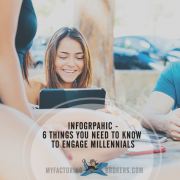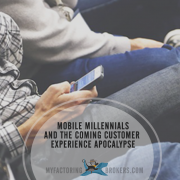Did you know 45% of younger consumers in the 16-34 age bracket believe they can directly influence the success – or failure – of your brand? Find out more about how younger consumers feel about brands.
Do Younger Consumers Like ‘Like’ Your Brand? New Data Reveals Consumers Attitudes Toward Brands by Generation
When it comes 16-34 year olds, 6 out of 10 say they encourage their friends to ‘like’ the brands they like. New Havas Worldwide study provides insights that can help you engage consumers online, across generational divides.
Perhaps it should come as no surprise that younger consumers are more willing to engage with brands as an important part of their social and online experience than ever before. A new study by Havas Worldwide titled, HASHTAGNATION: Marketing to the Selfie Generation provides new insights about how consumers in the 16-34 age bracket view brands, especially as compared to older consumers in the 35-54 and 55+ age groups. (Scroll down to see the slideshare.)

The study included responses from more than 10,000 consumers age 16+ across 29 different categories. They sought information about:
- How members of the millennial and Gen Z generations relate to brands
- How brands should seek to engage consumers in this 16-34 year old age range
- Which triggers and contexts are most vital when marketing to them
- Which tactics that worked with older generations of consumers need to be re-worked or retired altogether
While the study clearly reveals that 16-34 year old consumers feel more connected with (and want to connect more with) brands than their counterparts from earlier generations, 76% agree that “progress is not about consuming more, but consuming better.” More than half believe that the world would be a better place if people shared more and owned less, and would prefer to share, rather than own things.
Unlike some previous generations in which many members saw themselves as counterculture or in opposition to the attitudes of their parents, by and large, consumers in the 16-34 year old age range feel connected with earlier generations:
- Only 17% said they don’t have common values with previous generations
- 92% said it was “very important” that their parents trust them
These uber-connected consumers feel like brands play an essential role in their lives to the same extent (45%) that they also feel they have the power to influence a brand’s success or failure; however, half say they only follow brands to receive deals or discounts.
More than half of all millennial and Gen Y consumers say they like it when a brand encourages them to get involved with an important cause, a crowdfunding effort, video or photo creation, etc.
Children of the age of social validation, 6 out of 10 consumers age 16-34 say they feel good when they see someone they like using a brand that they like to use, and nearly half admit that they feel more connected to brands they observe in pop culture.
Why Should Brands Care What Millennial and Gen Z Consumers Think?
Millennial and Gen Z consumers don’t just look for social validation when it comes to the brands they like, 63% say they actively encourage other people to like the same brands they like. This propensity to encourage people to like their favored brands rises to 75% among “Prosumers,” who the study categorizes as consumers who:
- embrace innovation
- constantly seek out new information and experiences
- are enthusiastic adopters of new media and new tech
- view themselves as “human media” who transport attitudes and ideas
- are marketing savvy and demanding of brands
- are influential and looked to for opinions and recommendations
3 Key Take-Aways for Brands Marketing to Younger Consumers
Creating experience is more important than pushing products. Brands that facilitate personal connection between people or create the perception with younger consumers that they are making a personal difference (such as through cause marketing, crowdfunding, selfies or viral videos, etc.) as part of the customer experience will be more successful with these consumers.
Brands can provide more value by teaching and helping them develop their own unique styles and preferences than by ‘selling’ them on features and benefits.
Younger consumers prefer brands that are present, influential and seamlessly integrated with pop culture and it’s delivery platforms; e.g.:
- movies (whether viewed in theatre, on TV, via computer or mobile device, etc.)
- music and music delivery platforms such as Spotify, iTunes, Rhapsody, Amazon Music, Google Play, and others
- television
- magazines
- social media and content discovery platforms such as YouTube, Tumblr, Instagram







Leave a Reply
Want to join the discussion?Feel free to contribute!